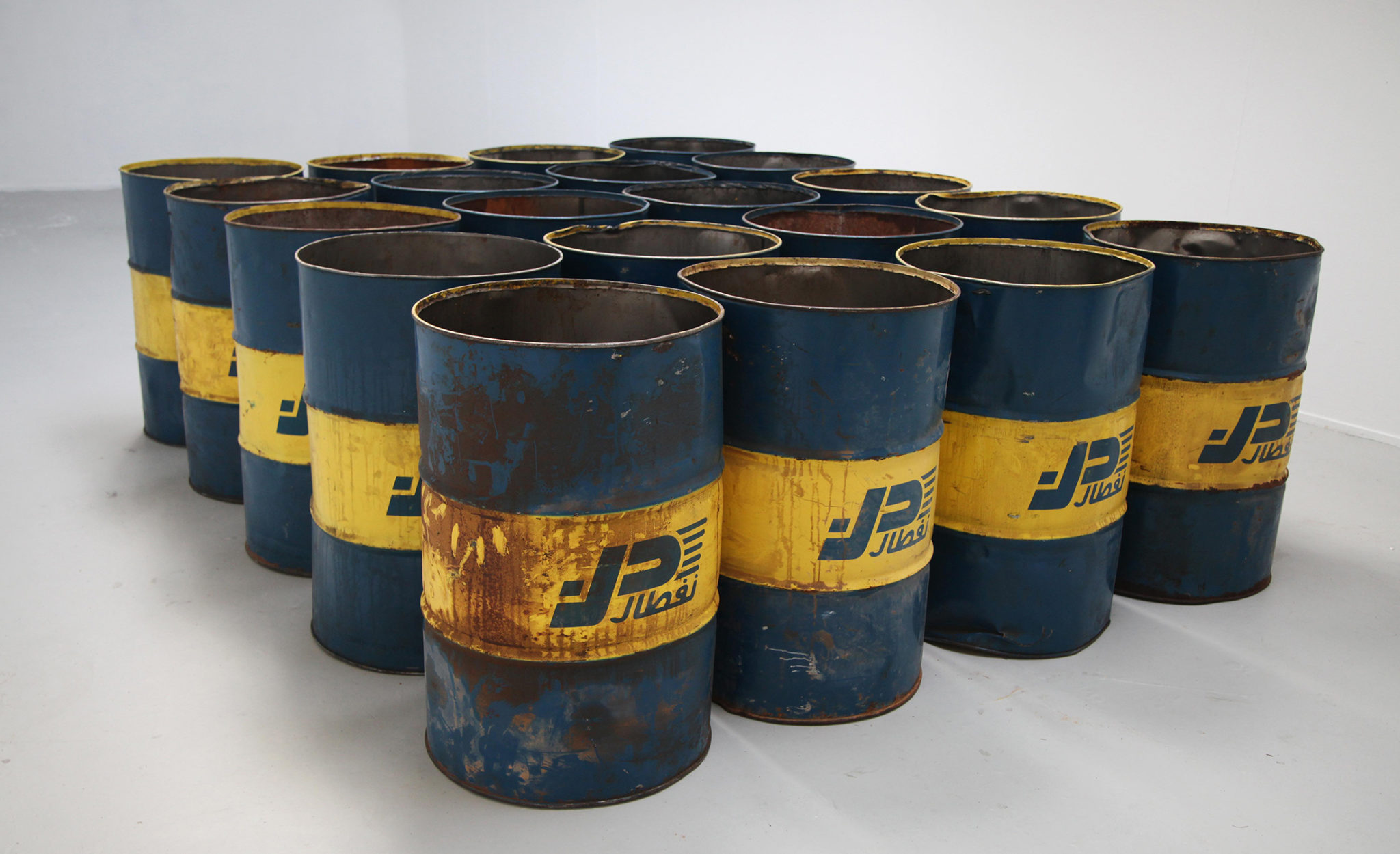one pic tuesday. Lydia Ourahmane

The Third Choir, 2014
sound installation, 3m x 5m
20x Naftal Oil Barrels imported from Algeria, CZ-5HE Radio Transmitter, 20x Samsung E2121B Phones
image courtesy the artist
–
After eight months planning and preparing for the realisation of the export, corresponding with shipping agencies in the UK and Algeria, I went over in April to collect the barrels and load the container which I had secured for shipping on 1 May 2014. Once I got there the first problem was sourcing them, as these specific blue and yellow barrels had recently been put out of production due to a change of shares within the oil company Naftal, subsequently including the branding. The person I had organised to purchase the original twenty barrels from had sold them by the time I got there and said he hadn’t seen more than one or two in the past few months, so this turned out to be a strange mission impossible. I was driving around, calling cousins in other towns to enquire, or call people they knew to ask if they had seen any of these barrels. So in the end most of them were purchased singularly, from various scrap yards, mechanics, old petrol stations off the motorways, building sites, people’s homes etc. The complications actually began when I went to the customs in Oran to try to process the clearance for the container, which had previously been scheduled to leave in six days. I knew it would be a problem if I was to be specific about the use of the items as I knew that exporting anything affiliated with ‘art’ from Algeria had been illegal since the implementation of a law restricting the movement of art in 1962, so I listed the export as the movement of personal goods. This was declined as they could not categorise empty metal barrels as personal items, along with the following six proposals which were variations of this; I was trying to submit them for clearance under different categories or sub-categories of personal exports, such as using them as part of an ‘architectural plan’ or ‘to make musical instruments’. All of which were declined, due to an obvious suspicion on the variations of the consecutive submissions for custom clearance on the same items.
The experience of constantly and consistently being at the mercy of someone else, within ranks of relative bureaucracies, and where technically nothing within your own power can shift that register. I think these restrictions are extremely interesting to work within, from the exterior, but equally in turn to find where there is potential. I really understood, to an extent, the finality which exists within ‘frustration’, making the idea of perseverance frantic or slightly deranged. It resulted in me needing permission from the Minister of Culture in Algeria to authorise the export when I had finally come out with the truth about the use of the items for an artwork, as otherwise it would have been impossible. It took six weeks of relaying phone-calls, emails, faxes between different customs offices in different cities as no one wanted to take responsibility in signing the authorisation, even though it had been granted permission as a cultural export.
The movement of these objects between borders and the laws and legislations which governed this was important for the work, that it faced these difficulties which gave it a momentum and energy that it may not have gathered if the process was straightforward. – LYDIA OURAHMANE in conversation with ADRIAN LEE, ArtVehicle 67
LYDIA OURAHMANE is part of the group exhibition Répétition currently on view at Villa Empain in Brussels until August 21, 2016. Please note also that she will be part of the exhibition that a body knows regardless which opens at Interstate Projects in Brooklyn on Thursday July 14, 2016.
–
comments are closed !